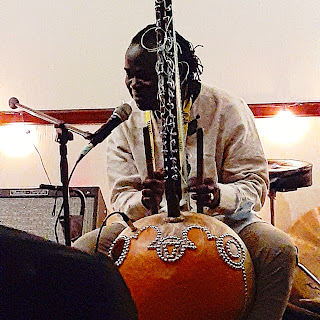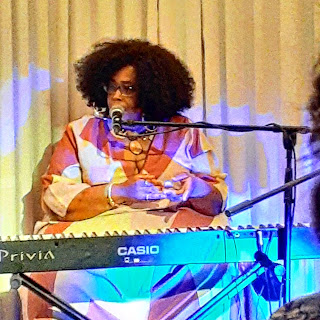 |
| The room explodes to Le Diable a Cinq |
That surprised and intrigued me, so I asked why.
“We like to serve,” Concepcion said from the little
spot I’d dug out for her in my messy back seat.
Reflecting on the good-natured attitude of all the
volunteers as we waited for trucks to arrive and keys to unlock doors, all the
little snafus of any such operation, I found myself connecting that spirit to the
patience expressed repeatedly throughout the conference.
Each night, the Westin hotel restaurant was overwhelmed
whenever the folkies came down to eat dinner and celebrate in the evening. One
night, desperately hungry, I squeezed into a spot at the bar, and a couple by my side managed to flag the server for me. We immediately
began expressing our concern for how overworked and understaffed the crew who
was serving us was, a conversation we would repeat the next day at the
merchandise table where I was working.
When things hitched up, I didn’t hear anyone complain.
These struggling artists and promoters all understood the nature of work. And,
in these congenial conversations, many with Kansas Citians I’d somehow never
met, we understood that, when it wasn’t completely overwhelming, this work we
were engaged in was rife with useful lessons.
Waiting on the truck we were to load, David and Concepcion showed me the quena flutes David plays, which originated with the indigenous Andean peoples. When I commented on the textile of David’s vest in a picture of the duo (which plans to tour Denmark, Sweden, Germany, and Spain this summer), David showed me a piece of the aguayo cloth they had with them, a beautiful wool woven from alpaca. Concepcion showed me how the aguayo could be worn for warmth, how it could hold a baby, and how it could also store food.
These lessons were topped off by a gift of a CD made by a group with which Concepcion plays cello called Ensamble Transatlantico de Folk Chileno. The album’s twelve tracks tour the varied cultures of Chile and blend those sounds with the folk music of Japan and Sweden, as well as performances by the Indian singer Shubham Modi, Colombian singer Victoria Saavedra, and the haunting vocals of Finland’s Viivi Maria Saarenkyla and Hilda Lansman. With a full orchestra composed of many woodwinds and strings, this Chilean tour of folk music is a head-spinning celebration of unity in our diversity, the motto in the liner notes taking me back to my previous blog— “we are all this and much more!”That last night, too, was a lesson in unity through
diversity. We began with a set from Toronto singer Melissa Lauren. She sang
jazz and blues-flavored gems accompanied by her producer Tyler Emond on guitar.
Lauren joked about how many of her songs were written about arguments with her
husband but promised, “we’ll get to more romantic songs.” She needn’t have
worried. Anyone whose been in a relationship long enough to survive an argument
or two could hear the love pouring through the struggle of each original— “The
Day We Stopped,” “My Blue Friend,” “Back to You,” and “My Voice,” as bright and
clear as Lauren’s voice.
Melissa Lauren, “The Day We Stopped”— https://www.youtube.com/watch?v=qPPIV0hGrv4
 |
| Gilles Garand and Le Diable a Cinq |
Back at Mundial Montreal, Folk Quebec host Gilles Garand started the set by Le Diable a Cinq with a fevered harmonica solo. After about one song of the band’s set, Garand was walking down the aisle telling people to stack their chairs against the wall. In moments, the chairs were gone, and the room exploded with dancing and clapping to these Cajun-like jigs and reels.
Le Diable a Cinq, “Les Chaises a Chabot”—https://www.youtube.com/watch?v=fxFEVd_DKkg&list=RDfxFEVd_DKkg&start_radio=1&rv=fxFEVd_DKkg&t=11
 |
| Zal Sissokho and Kora Flamenco |
Kora Flamenca, “Manssani”—https://www.youtube.com/watch?v=1ZDcf4WJ6DM
Our night ended back in the “Women of Note” room, where
Aoife Scott was hosting the UK’s Katherine Priddy, New Orleans-based Lilli
Lewis, and New York folk-blues singer Elly Wininger. Priddy began with the
remarkably tender and tough “Wolf” about loving someone who is “everything I
hate,” that contradiction nicely mapping out the tough territory ahead of us.
Katherine Priddy, “Wolf”— https://www.youtube.com/watch?v=iq34LkghY38
After another forbidden love song in Gaelic by Scott,
Lewis raised the stakes with “Piece of
Mind,” calling it, “my one murder ballad.” Wininger finished off this
round with a minor-keyed and gorgeous explanation for why these hard songs must
be sung, the title track to her album, “The Blues Never End.”
Elly Wininger, “The Blues Never End” -- https://www.youtube.com/watch?v=rQOTlvdeocs
After that, Priddy’s “Letters from a Traveling Man” seemed
like the living damnation so often associated with the blues singer as well as that
hapless lover from “Wolf.” It’s not unsympathetic…. She sings from his point of
view. But the man wants a fire waiting for him while promising he won’t pass
this way again.
 |
| Lilli Lewis and Aoife Scott |
Scott took the strain of such personal politics to the bigger picture with a cover of Damien Dempsey’s “The Colony” accompanied by her “fella” Andy Meany on guitar and Lilli Lewis on keys. With a litany of violence, that song describes the common cause that binds together the Irish with the indigenous people of North America, Australia, and Africa, and it ends with the hard-fought declaration, “You’ll never kill our will to be free.”
Lewis answered this with a story about the cotton gin
and how Eli Whitney’s invention transformed the business of cotton into an exponentially
more brutal system. And then she sang “Wednesday’s Child,” a song she
called her own story, of violence, sickness, and suicide rooted in the bigotry
of those who stole and sold her family. Wininger used “Alabama Blues,” about
the attack on women’s reproductive rights specifically, to underscore the set’s
direction, a tale of women under siege from every conceivable front.
Lilli Lewis, “Wednesday’s Child” https://www.youtube.com/watch?v=dVm637vTOSE
That coherence of this in-the-round session showed the
potential of a collaborative set, each woman playing off the other’s
perspective, each expanding our concept of how the personal and the political tie
together.
I find myself again thinking about David and
Concepcion’s concept of the conference itself as an opportunity to serve the
music and to serve the musical community. At its prevalent best, that is what
Folk Alliance does—the entire activity of gathering these people together in
one place to meet in affinity groups and to discuss every aspect of their careers
from songwriting to promotion. ‘
That, too, is the spirit of these blogs. I will have
done my job if I’ve been of some small service to the music. It’s the music which
binds us together, after all, and, as Scott sang in “The Colony,” it’s the music
that holds the key to our freedom.
 |
| Lilli Lewis |
 |
| Katherine Priddy |













.jpg)










